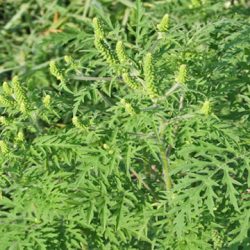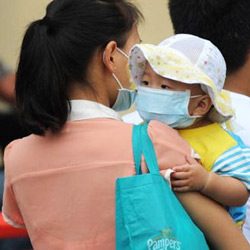Ragweed (Ambrosia artemisiifolia) - an otherwise unremarkable plant - produces pollen that can trigger strong allergic reactions such as asthma even in very small quantities. Scientists from Technische Universität München (TUM) and Helmholtz Zentrum München have now published a joint study showing that the substance previously identified as the major allergen only induces such … [Read more...]
Asthma & Allergies

Older asthma patients at increased risk for treatment failure: American Thoracic Society Study
Older patients with asthma are at increased risk for treatment failure, particularly those patients being treated with inhaled corticosteroids, according to a new study. "Asthma morbidity and mortality are known to be increased in middle-aged and older patients, and gender may also affect the incidence and course of the disease, but the impact of age and gender on asthma … [Read more...]
State-of-the-science treatment for allergic rhinitis: A Study
The American Academy of Otolaryngology--Head and Neck Surgery Foundation addresses quality improvement opportunities in the diagnosis and management of allergic rhinitis in a new multi-disciplinary, evidence-based clinical practice guideline, published today in Otolaryngology-Head and Neck Surgery. "Allergic rhinitis occurs when you inhale something that you're allergic to, … [Read more...]
Trigger allergic asthma response identified: University of California Study
Researchers at the University of California, San Diego School of Medicine, with collaborators in Korea and Scotland, have identified a novel signaling pathway critical to the immune response of cells associated with the initiation of allergic asthma. The discovery, they say, could point the way to new therapies that suppress the inflammatory allergic response, offering … [Read more...]
Updated clinical practice guidelines for Adult sinusitis: American Academy of Otolaryngology
An updated clinical practice guideline from the American Academy of Otolaryngology--Head and Neck Surgery Foundation published in Otolaryngology-Head and Neck Surgery identifies quality improvement opportunities and explicit actionable recommendations for clinicians managing adult sinusitis, including a greater focus on patient education and patient preference. "More than … [Read more...]
Disposable devices to identify allergies developed: A Mexican Study
Gabriel Caballero Robledo from the Center for Research and Advanced Studies (CINVESTAV) at Monterrey, Mexico, is working on the design of a small medical device capable of detecting allergies or diseases quickly and at a low cost. During his stay in the Netherlands to pursue postdoctoral studies, Caballero Robledo met French colleagues who worked with microfluidic devices … [Read more...]
Work-related asthma: A Study
Certain topics are difficult to discuss with your doctor -- work-related asthma is apparently one of them. Identifying a health issue related to your job is scary because you don't want a doctor telling you things may have to change -- maybe even how you earn a living. And often, doctors don't bring it up with their patients. According to a new study published in the Annals … [Read more...]
Targeting nerve endings to curb allergic asthma : A Study
Current asthma medications, which work by suppressing inflammatory signaling by immune cells or by dilating the airways, can stop working over time. A study from Boston Children's Hospital, Brigham and Women's Hospital, and Harvard Medical School supports a surprising alternative approach to controlling asthma: targeting certain sensory nerve endings in the lungs that help … [Read more...]
Biphasic allergic reactions in children: Children’s Hospital of Eastern Ontario Research Institute Study
Children are more likely to have a repeat, delayed anaphylactic reaction from the same allergic cause, depending on the severity of the initial reaction. The first pediatric study to look at the predictors for this phenomenon was published today in Annals of Allergy, Asthma & Immunology. Anaphylaxis is a severe, allergic reaction that is rapid in onset and can result in … [Read more...]
Scientists finds cause of allergic asthma: A German Study
Discovery improves understanding of the cause of allergic asthma and may serve as an early diagnostic marker. When the mucosal surfaces in the lungs of healthy people come into contact with allergenic substances, so-called regulatory T cells also known as Treg cells, are activated. These are capable of actively preventing the development of allergies. However, if these … [Read more...]
Treatment for Mysterious and growing allergic reaction: A Ohio State University Study
Its name is daunting. It's the hottest topic among allergy experts. It's showing up more and doctors don't yet know why. Allergy specialists at The Ohio State University Wexner Medical Center are seeing more people with eosinophilic esophagitis (EoE), an inflammatory response in the esophagus that makes it hard to swallow food. "It's considered a newer medical diagnosis, … [Read more...]
New solutions to fight pediatric asthma: University of California Study
Low flu vaccination rates, medication compliance and limited access to primary care providers have contributed to the high pediatric asthma rates in California, say UC Davis pediatricians Ulfat Shaikh and Robert Byrd, who have published an extensive study describing the challenges faced by children with asthma in California. Analyzing data from the 2011-12 California Health … [Read more...]
Children with asthma likely born in area with high air pollution: A Study
Children who develop asthma in Toronto are more likely to have been born in a neighbourhood that has a high level of traffic-related air pollution, new research suggests. Researchers identified a number of "clusters" where higher numbers of children who developed asthma were born, including Parkdale-Little Portugal, west of downtown Toronto; the neighbourhood where the Don … [Read more...]
Severe asthma fails to respond to mainstay treatment: University of Pittsburgh Study
The immune response that occurs in patients with severe asthma is markedly different than what occurs in milder forms of the lung condition, according to researchers from the University of Pittsburgh School of Medicine. Those unique features could point the way to new treatments, they said in an article published online in the Journal of Clinical Investigation (JCI). People … [Read more...]
Researchers discover promising targets for treating allergies, asthma: University of Colorado Study
Researchers in the United Kingdom, the United States, Sweden and Canada report in Nature that they have discovered more than 30 genes that have strong effects on Immunoglobulin E (IgE), allergies and asthma. IgE is the antibody that triggers allergic responses. Among the genes are promising novel drug targets for treating allergies and asthma. Allergies affect 30 percent of … [Read more...]
Drug targets for allergies and asthma: Imperial College London Study
Scientists have discovered over 30 new genes that predispose people to allergies and asthma, some of which could be targets for new drugs. Asthma affects one child in 10 in the UK, and allergies may affect one third of the population. The new findings could lead to new treatments for allergic diseases, and will help to predict who will best respond to currently available … [Read more...]
Immune cells commit suicide to prevent allergy: A Study
Scientists from the CNRS, INSERM and Université de Limoges, working in the Laboratoire Contrôle de la Réponse Immune B et Lymphoproliférations (CNRS/Université de Limoges)[1] have demonstrated that the production of type E immunoglobulins (IgE)[2] by B lymphocytes induces a loss in their mobility and the initiation of cell death mechanisms. These antibodies, present in small … [Read more...]
Psychedelic drug prevents asthma development: A Louisiana State University Study
Research led by Charles Nichols, PhD, Associate Professor of Pharmacology and Experimental Therapeutics at the LSU Health New Orleans School of Medicine, has found that a psychedelic drug, (R)-DOI, prevents the development of allergic asthma in a mouse model. The effects are potent and effective at a concentration 50-100 times less than would influence behavior. The research … [Read more...]
Advisory about not feeding peanuts to infants and young children at risk for peanut allergy: American College of Surgeons
Pediatric otolaryngologists and surgeons are concerned with parents getting the wrong message regarding the safety/desirability of letting babies and young children eat peanuts to prevent them from developing peanut allergies. Last week's news coverage of a scientific article published February 26, 2015, in the New England Journal of Medicine, (reference below) "Randomized … [Read more...]
Reducing animal testing for skin allergies: European Commission
The JRC has validated and recommended a new method which is not based on animal testing, to identify chemicals that can trigger skin allergies, estimated to affect already 20% of the population in Europe. The human Cell Line Activation Test (h-CLAT) has been developed by industry and validated by the JRC managed European Union Reference Laboratory for Alternatives to Animal … [Read more...]
New ultrasensitive test for peanut allergies: University of Connecticut Study
Current peanut allergy tests are not very reliable when it comes to diagnosing the severity of an individual's allergic reaction, which can range from hives to life-threatening anaphylactic shock. With an estimated three million people in the United States allergic to peanuts and tree nuts, having a more precise and reliable allergy test could prevent hospitalizations and … [Read more...]
Genes play a role in peanut allergies: A Johns Hopkins Bloomberg School Study
Researchers have pinpointed a region in the human genome associated with peanut allergy in U.S. children, offering strong evidence that genes can play a role in the development of food allergies. But in an additional finding that suggests genes are not the only players in food allergies, the Johns Hopkins Bloomberg School of Public Health-led research team found there may be … [Read more...]
Marijuana may cause allergy: A Study
Growing up, you may have been given reasons for not smoking marijuana. What you may not have heard is that marijuana, like other pollen-bearing plants, is an allergen which can cause allergic responses. A new article published in the Annals of Allergy, Asthma and Immunology, the scientific publication of the American College of Allergy, Asthma and Immunology (ACAAI), summarizes … [Read more...]
State-of-the-science treatment for allergic rhinitis: A Study
The American Academy of Otolaryngology--Head and Neck Surgery Foundation addresses quality improvement opportunities in the diagnosis and management of allergic rhinitis in a new multi-disciplinary, evidence-based clinical practice guideline, published today in Otolaryngology-Head and Neck Surgery. "Allergic rhinitis occurs when you inhale something that you're allergic to, … [Read more...]
Blood test predicts severity of peanut and seafood allergies: A Study
A new blood test promises to predict which people will have severe allergic reactions to foods according to a new study led by Mount Sinai researchers and published online in the The Annals of Allergy, Asthma & Immunology. To detect food allergies, physicians typically use skin prick tests or blood tests that measure levels of allergen-specific IgE (sIgE), a protein made … [Read more...]
Air pollutants could boost potency of common airborne allergens: American Chemical Society Study
A pair of air pollutants linked to climate change could also be a major contributor to the unparalleled rise in the number of people sneezing, sniffling and wheezing during allergy season. The gases, nitrogen dioxide and ground-level ozone, appear to provoke chemical changes in certain airborne allergens that could increase their potency. That, in combination with changes in … [Read more...]
Uncovering the effects of cooking, digestion on gluten and wheat allergies in pasta
Researchers trying to understand wheat-related health problems have found new clues to how the grain's proteins, including gluten, change when cooked and digested. They report in ACS' Journal of Agricultural and Food Chemistry that boiling pasta releases some of its potential allergens, while other proteins persist throughout cooking and digestion. Their findings lend new … [Read more...]
Bacteria and Worms in the digestive tract offers protection against allergic and autoimmune problems: A Duke University Study
A growing body of evidence in the medical community holds that greater diversity of bacteria and even worms in the digestive tract offers protection against a variety of allergic and autoimmune problems. Germs from healthy people can be used to heal people with digestive disorders and other conditions caused by the loss of their own germs, and worms that live in the gut, … [Read more...]
Food allergies can be transmitted from blood products to children in rare cases: A Canadian Study
In rare cases, children can develop anaphylactic allergies to previously tolerated foods after receiving blood products via transfusion, report the authors of a case study published in CMAJ (Canadian Medical Association Journal). "It is very unusual to identify someone who experienced passive transfer of allergy from blood products," says Dr. Julia Upton, The Hospital for … [Read more...]
Witnessing drug problems or domestic violence causes greater asthma incidence: A Study
No home is perfect, but dysfunction in the home is now revealed to be especially dangerous for children at risk for asthma. A new study shows that children exposed to just one adverse childhood experience (ACE) had a 28 percent increased chance of developing asthma than those with no ACEs. The study, published in the Annals of Allergy, Asthma and Immunology, the scientific … [Read more...]
- « Previous Page
- 1
- …
- 3
- 4
- 5
- 6
- 7
- …
- 13
- Next Page »





























